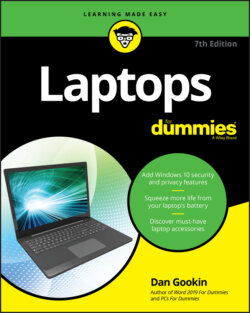Читать книгу Laptops For Dummies - Dan Gookin - Страница 41
Important laptop hardware guts
ОглавлениеFor a laptop, weight, size, and battery take center stage. However, these components aren’t the only hardware specs you should pay attention to. As with all computers, other hardware items play a role in computer performance and must also be part of your laptop purchase decision. They are described in this list:
Processor: Spend the extra money to invest in a fast processor. Doing so extends the useful life of your laptop by ensuring that you can run tomorrow's software before tomorrow comes, but not before yesterday. You'll be thankful later.
Memory: Memory is where the action happens in a computer, where the work gets done. Not having enough memory in your laptop limits its performance. Having enough (or way too much) memory makes Mr. Laptop very happy.
Mass storage: The mass storage device is the electronic closet where the laptop stores your stuff. The mass storage device is either the traditional hard drive or a solid-state drive (SSD). It must have room for the computer's operating system, all the software you get and later install, all the data files and junk you collect, plus room (lotsa room) to grow.
The processor is the main chip inside a computer. It’s not the computer’s “brain.” Software is the computer’s brain. No, the processor is more like the computer’s muscle.
Laptop processors are more expensive than their desktop counterparts. The reason is that laptop processors are designed to use less power and generate less heat. These improvements take time, so their development cycle is longer; hence the added cost.
How do you know how much memory or storage is enough? Easy: Look at the software you want to use. For example, if the software states that it wants 2GB of memory, get a laptop with at least that much memory. If the software requires at least 100GB of drive storage space, factor that amount into your laptop’s mass storage capacity requirements.
If you cannot afford a faster processor, get more RAM.
The things that consume huge amounts of drive storage space are video, music, and photos, in that order. If you plan to collect any of these types of files on your laptop, get a humongous hard drive!
I recommend a laptop with at least 500GB of mass storage. If you need more storage, obtain a traditional hard drive because high-capacity SSDs are expensive.
Tablet PCs don’t require as much storage as traditional laptops. The reason is that tablet PCs are used primarily for nonproductivity purposes — reading email, browsing the web, or enjoying digital entertainment.
Few, if any, laptops today come with an optical drive. If you need such a drive, buy an external, USB DVD drive. You can attach this drive to your laptop when needed; you don’t need to lug the gizmo around with you.
By investing in the latest, fastest processor, lots of RAM, and copious amounts of mass storage now, you’re extending the life of your laptop. That's a good thing. You want your laptop investment to last for years. Pay more now, and you earn it back down the road, when you're still using your laptop while others are forced to buy a new one.
GB is the abbreviation for gigabyte. It means 1 billion characters of computer storage. A GB is approximately 1,000MB. MB is the abbreviation for megabyte, or 1 million characters of computer storage. One MB stores about one minute of music, a 3-by-4-inch digital photo of low quality, or as much text as you’ll find in a typical novel with or without a decent plot.
